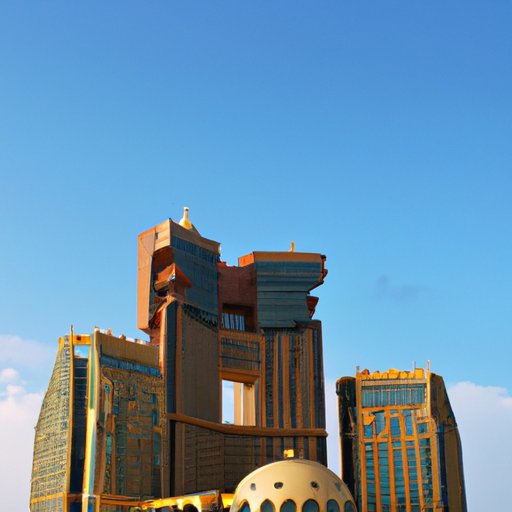Introduction
Are there casinos in Qatar? This question is one that many people might ask when planning a trip to the oil-rich Arabian Gulf country. While gambling might be a popular pastime in many parts of the world, this is not the case in Qatar, where casinos are not allowed. In this article, we’ll explore Qatar’s laws and regulations on gambling, its cultural significance, and the economic impact of the no-casino policy on tourism. We’ll also hear from a local on their thoughts and perspectives on this topic.
The Truth About Gambling in Qatar: Why You Won’t Find Casinos in This Country
Qatar, like other countries in the region, has a strict ban on casinos and gambling. This is primarily due to the Islamic prohibition on gambling, which is derived from the Quran and its teachings. According to religious authorities, gambling is haram, or forbidden, because it involves risking one’s wealth or property and can lead to addiction and social problems.
Qatar’s laws on gambling reflect this religious proscription. The country’s Criminal Law prohibits both public and private gambling, including online gambling. Anyone caught gambling can face heavy fines and imprisonment. The government has also taken steps to block access to gambling websites and apps to prevent citizens from engaging in these activities.
Other countries in the region, such as Saudi Arabia and the United Arab Emirates, also have similar bans on gambling. These countries place a high value on Islamic traditions and customs, and as such, they prioritize the promotion of values that align with their religious beliefs and national identity.
Qatar’s Stance on Gambling: Exploring the Laws and Regulations
The laws related to gambling are strictly enforced in Qatar. Anyone caught violating the no-gambling policy can face severe penalties. For instance, under Article 273 of the Criminal Law, anyone caught gambling in public or private can be imprisoned for up to six months and fined up to QAR 3,000 (USD 820).
In addition to these penalties, the government has also implemented measures to prevent the spread of gambling in the country. For instance, the country blocks access to gambling websites and platforms. The Ministry of Transportation and Communications also works to block online gambling sites and prevent their access from local IP addresses.
Despite these measures, there have been cases of people engaging in gambling activities in Qatar. For instance, in 2020, the authorities arrested a group of people who were running an illegal gambling racket and confiscated QAR 4 million (USD 1.1 million) worth of assets. The group had been operating a private gambling club in Doha, where they facilitated games like poker and blackjack. This case highlights the severity of the punishments for those who violate Qatar’s gambling laws, as well as the government’s commitment to enforcing these laws.

Alternative Entertainment in Qatar: What to Do Instead of Gambling
Despite the strict laws on gambling, Qatar still offers plenty of activities and entertainment options for tourists and locals alike. From cultural experiences to outdoor adventures, there is something for everyone in this country.
For instance, visitors can explore the many museums and art galleries in Doha, including the Museum of Islamic Art and the Mathaf: Arab Museum of Modern Art. There are also plenty of outdoor activities, such as visiting the Aspire Park or taking a desert safari tour. For those interested in sports, the Khalifa International Stadium and the Al Bidda Park are excellent options. Visitors can also enjoy the many fine-dining options and shopping experiences in Qatar.
Participating in traditional Qatari activities is also a unique experience. For instance, visitors can watch traditional Qatari dancing, known as the Ardah, or visit a souq, or traditional market, to experience local culture and purchase locally-made goods.
The Economic Impact of Qatar’s No-Casino Policy
While the ban on casinos and gambling is a part of Qatari cultural identity and reflects the country’s Islamic values, it does have an economic impact. Qatar has been working to build its tourism industry in recent years, but the no-casino policy could be seen as a hindrance to this effort.
In 2019, the tourism industry in Qatar generated over QAR 20 billion (USD 5.5 billion) in revenue. However, this is a small fraction of the revenue generated by countries like the UAE and Saudi Arabia, which have more established tourism industries. Both of these countries allow for some forms of gambling, such as horse racing and sports betting.
Allowing casinos in Qatar could potentially attract more tourists and increase revenue for the country. For instance, in neighboring Bahrain, the government has authorized the construction of several casinos in recent years as part of its efforts to boost tourism. However, the Qatar government has not shown any inclination to change its policy on gambling, signaling that its cultural identity remains a priority.
The Cultural Significance of Qatar’s Resistance to Gambling
The prohibition on gambling in Qatar is reflective of the country’s Islamic identity and cultural values. As a country that places a high value on social and cultural norms, the no-casino policy is seen as necessary to maintain these norms.
Qatar’s commitment to preserving its culture is evident in other areas as well. For instance, the country has strict laws related to public behavior, dress, and alcohol consumption. In addition to these laws, the country has made significant investments in preserving its cultural heritage, including the construction of the Katara Cultural Village and the establishment of the Qatar National Library.
The no-casino policy is also in line with the country’s efforts to preserve its Islamic identity. As a country that values its religious traditions, the policy is seen as necessary to uphold these traditions and prevent social problems associated with gambling, such as addiction and financial hardship.
Tourism and Gambling: Can Qatar Attract Visitors Without Casinos?
Maintaining a strong tourism industry is a priority for Qatar, but the country’s no-casino policy presents a challenge. However, other countries have been successful in promoting tourism without relying on gambling.
In Japan, for example, gambling is only recently being legalized. Despite this, the country has been successful in attracting tourists with its cultural and technological offerings. The country has invested in promoting outdoor tourism, such as hiking and cycling, as well as traditional Japanese cultural experiences, such as observing tea ceremonies and participating in martial arts classes.
In Qatar, the government has been taking steps to promote the country’s cultural and natural offerings. The Qatar National Tourism Strategy 2030 aims to increase the number of annual visitors to the country to 10 million by 2030. The country is investing in infrastructure, including the expansion of Hamad International Airport and the construction of new hotels and resorts. The government is also promoting Qatari cultural experiences, such as traditional music and dance performances and culinary tours, to attract more tourists to the country.
Interview with a Qatari Local: Perspectives on Gambling in Our Country
We spoke with a Qatari local who wished to remain anonymous about their perspectives on the no-casino policy. They highlighted the importance of cultural identity and Islamic values in shaping the policy.
“Gambling is not a part of our culture or values,” they said. “As a Muslim and a Qatari, it is important for us to uphold these traditions and avoid anything that would harm our society and reputation.”
They also mentioned that alternative entertainment options are available in Qatar, such as attending cultural performances or participating in outdoor adventures. They noted that these types of activities are in keeping with Qatari culture and values and provide rich, unique experiences for both tourists and locals.
Conclusion
Qatar’s no-casino policy reflects the country’s Islamic values and cultural identity. While the ban on gambling may pose a challenge to the country’s efforts to boost tourism, the Qatar government remains committed to promoting its cultural and natural offerings as an alternative. As the country continues to invest in infrastructure and promote its unique experiences, it is likely that tourists will continue to flock to Qatar for its unique and authentic offerings.
